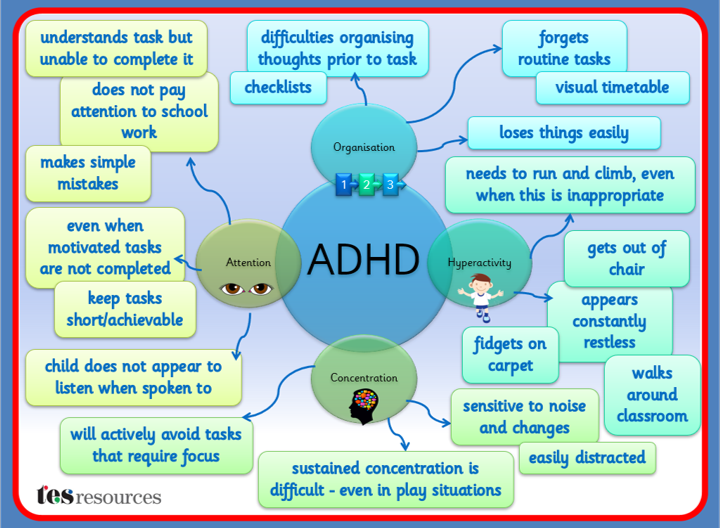Attention Deficit Hyperactivity Disorder (ADHD)
ADHD is a common condition characterised by difficulty staying focused and paying attention, difficulty controlling behaviour (impulsiveness), and hyperactivity (over-activity). It is a lifelong condition, but adults can learn to regulate the characteristics. Children may fall into one of three sub-types of ADHD:
- Predominantly inattentive type
- Predominantly hyperactive-impulsive type
- Combined inattention and hyperactive impulsive type
People tend to focus on the hyperactivity aspects of ADHD. However, there are many aspects of learning that can be affected by the condition, as shown in the image below.

Tips
- Offer routines and structure
- Create a quiet space for them to learn with no distractions.
- Give them something to fiddle with whilst you are talking to them or you want them to focus. It can also be helpful to let them move around whilst they listen.
- Ask them to do one task at a time
- Provide checklists or visual timetables to support organisation.
- Use timers to help with time management and build in frequent movement breaks.
- Suggest rather than criticise (children with ADHD often have low self-esteem)
- Provide lots of opportunities for exercise and movement.
- Set up a reward scheme to encourage them and support them with their behaviour.
- Build on success and help children to pursue more of what they enjoy.
- Put clear boundaries in place.
Resources
https://www.thebodycoach.com/blog/pe-with-joe-1254.html
Play games on consoles such as just dance, Wii Sports etc. to get your kids moving.
Information Websites
https://www.adhdfoundation.org.uk/information/parents/
General Info on ADHD - http://www.adders.org/info170.htm
Self esteem - http://www.adders.org/info79.htm
Managing ADHD - http://www.adders.org/info58.htm